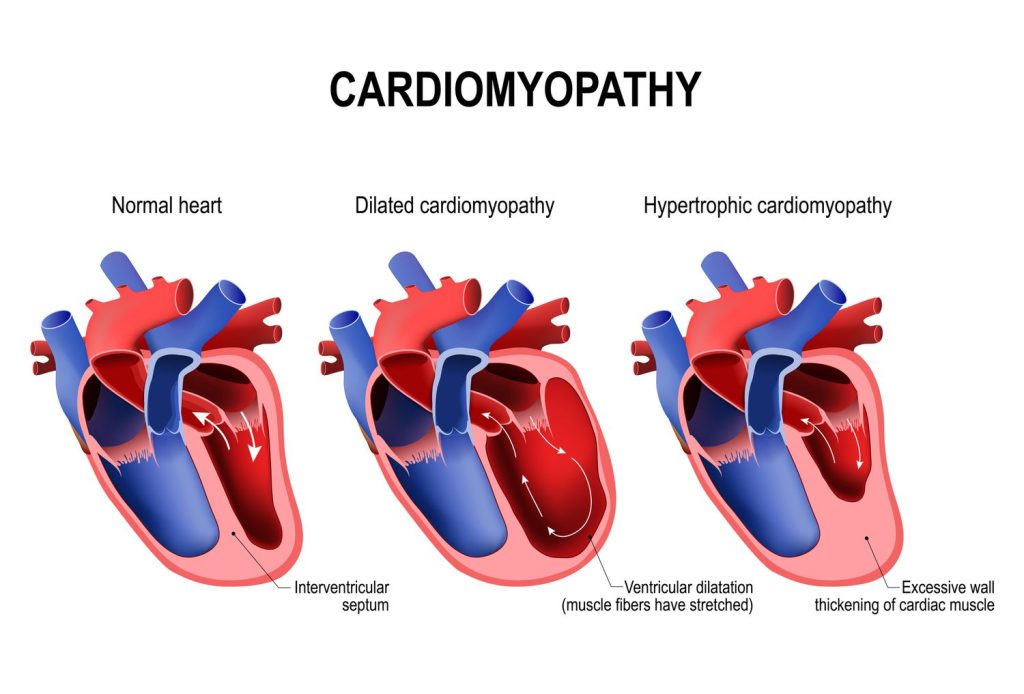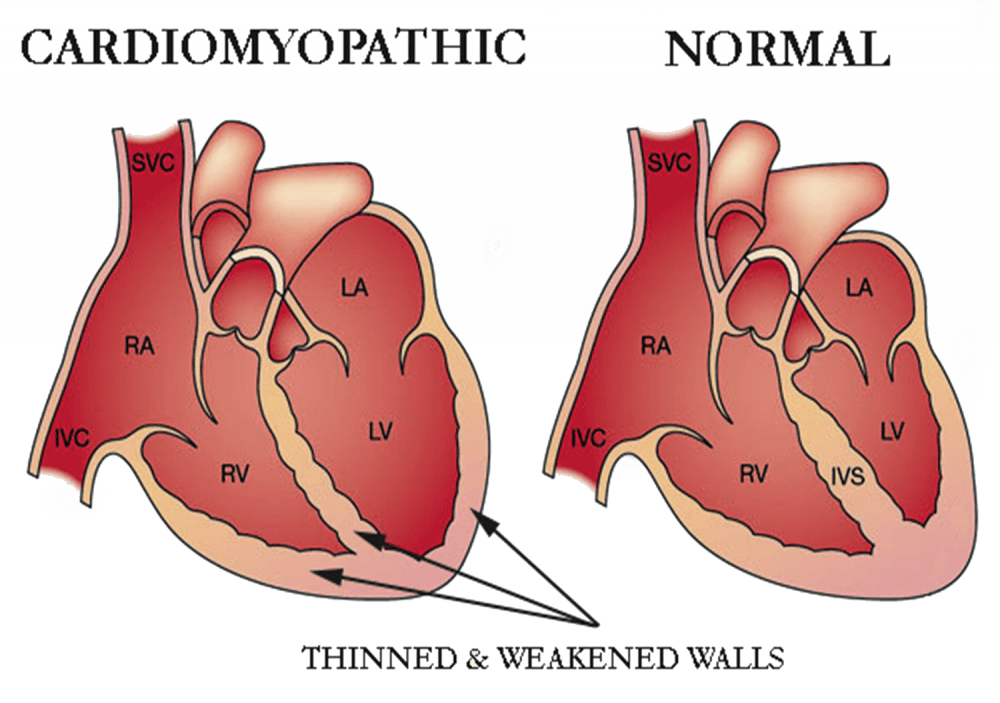Cardiomyopathy
Cardiomyopathy refers to conditions that affect your heart muscle. If you have cardiomyopathy, your heart can’t efficiently pump blood to the rest of your body. As a result, you may experience fatigue, shortness of breath or heart palpitations. Cardiomyopathy gets worse over time. Treatment can slow the progression and improve your quality of life.

How serious is it?
If you have dilated cardiomyopathy, you’re at greater risk of heart failure, where the heart fails to pump enough blood around the body at the right pressure.
Heart failure typically causes shortness of breath, extreme tiredness and ankle swelling. Learn more about the symptoms of heart failure.
There’s also a risk of heart valve problems, an irregular heartbeat and blood clots. You’ll need to have regular appointments with a GP so the condition can be monitored.
Types
There are many types of cardiomyopathy; which kind you have depends on the problem with your heart.
Hypertrophic cardiomyopathy
This type of cardiomyopathy causes the heart muscle to become larger and thicker than normal. The thickened areas can block the ventricles (the lower chambers of the heart), making it harder for the heart to pump blood.
Dilated cardiomyopathy
This is a common condition that happens when the ventricles in the heart weaken and get larger. The weakened ventricles don’t pump well, and this makes your heart work harder.
Arrhythmogenic cardiomyopathy
This rare condition develops when fatty or scarred tissue replaces the normal muscle tissue in the right ventricle. This can cause an irregular heartbeat (arrhythmia). Arrhythmogenic cardiomyopathy usually affects teens or young adults, and it raises the risk for cardiac arrest. In fact, it is the most common cause of sudden death in young people and in athletes.
Restrictive cardiomyopathy
This rare type of cardiomyopathy causes the ventricles to stiffen, but the walls of the heart do not thicken. Because of this, the ventricles don’t relax and don’t fill with enough blood to pump to the rest of the body. Transthyretin amyloid cardiomyopathy is a rare type of restrictive cardiomyopathy that is more common in African-American men.
Left ventricular noncompaction
This rare type of cardiomyopathy occurs when the left ventricle develops muscle that is both smooth, as it should be, and loose, like a thick web. The loose muscle can extend into the left ventricle. This weakens the heart muscle and prevents the heart from pumping enough blood to the rest of the body.
Takotsubo cardiomyopathy, or broken heart syndrome
This rare condition develops when extreme stress causes the heart muscle to stop working properly. This condition affects more women than men and is more common after menopause.

Symptoms
Some people who have cardiomyopathy never have symptoms, while others may show signs as the disease progresses. These might include the following:
- Shortness of breath or trouble breathing.
- Fatigue.
- Swelling in the ankles and legs.
- Irregular heart beat or palpitations.
- Syncope, the medical term for fainting or briefly passing out.
What tests will be done to diagnose cardiomyopathy?
Tests to diagnose cardiomyopathy may include:
- Ambulatory monitoring.
- Blood tests.
- Chest X-ray.
- Cardiac CT.
- Heart MRI.
- Echocardiogram.
- Electrocardiogram (EKG).
- Exercise stress test.
- Cardiac catheterization.
- Myocardial biopsy.
How is cardiomyopathy treated?
Treatment varies depending on how damaged your heart is due to cardiomyopathy and the resulting symptoms.
Some people may not require treatment until symptoms appear. Others who are beginning to struggle with breathlessness or chest pain may need to make some lifestyle changes or take medications.
You can’t reverse or cure cardiomyopathy, but you can manage it with some of the following options:
- Heart-healthy lifestyle changes, such as aiming for a moderate weight, trying to quit if you smoke, following a balanced and nutritious diet, managing stress when possible, and getting the right amount of physical activity
- Medications, including medications used to treat high blood pressure, prevent water retention, keep the heart beating with a normal rhythm, prevent blood clots, and reduce inflammation
- Surgically implanted devices, like pacemakers and defibrillators
- Surgery, if symptoms are severe and medications don’t work well, bypass surgery or valve surgery may be an option. A less common procedure is septal myectomy, which involves removing some heart tissue in order to improve blood flow through the heart
- Heart transplant, which is considered a last resort
The goal of treatment is to help your heart work as efficiently as possible and to prevent further damage and loss of function.

Outlook for cardiomyopathy
Cardiomyopathy is a progressive disease that involves the weakening of the heart muscle. If your heart weakens too much, it will be unable to pump blood properly to the organs and tissues throughout your body.
Cardiomyopathy can be caused by coronary artery disease, a heart attack, or some other underlying health condition. In some cases, it can be genetic, which means you inherited it from your parents. In other instances, the cause is unknown.
There are several types of cardiomyopathy, each with their own cause. The two most common types are dilated cardiomyopathy and hypertrophic cardiomyopathy.
Common symptoms of cardiomyopathy include shortness of breath, fatigue, and swelling in the feet, ankles, legs, abdomen, or veins of the neck.
If you notice any of these symptoms, contact your doctor as soon as possible. The sooner you can get treatment for this condition, the lower your risk of heart damage and loss of function.
Treatment in Türkiye:
The medical staff of surgical teams, doctors and consultants in Rehab Türk can provide the best treatment options and free consultations – by striving to keep abreast of the latest medical technologies and methods.

